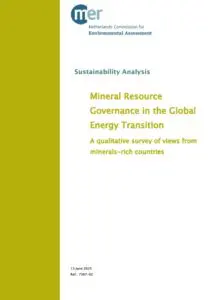Sibout Nooteboom
Strategic Advisor

How can green hydrogen production for the Netherlands and Europe contribute to sustainable development in low- and middle-income countries? In March, the NCEA, the Ministry of Foreign Affairs and Haskoning, in collaboration with Clindendael, organized a closed, in-depth dialogue about this question. The audience was varied, with i.e. representatives from the Ministries of Economic Affairs (EZ) and Climate and Green Growth (KGG), various private sector actors, knowledge institutes and other organisations.
The aim of the meeting was to contribute to a broader, structured dialogue on ensuring sustainable impact outcomes of green hydrogen development and import, including through dedicated ESG. The conversation also touched upon the strategic capacity needed in supplying low-and-middle-income-countries to steer this new sector, balancing social, economic, and environmental interests.
The participants highly appreciated the openness, relevance and timeliness of the dialogue and expressed the intend to continue this conversation in various settings and occasions, including stakeholders of the wider GH2 ‘ecosystem’. The first step towards this goal has already been taken at the Green Hydrogen Summit (Rotterdam, 19-21 May, see this news item).
13 June 2025
‘Why is my government not more transparent on its dilemmas? It appears to me as a lack of political will, but it could also be a lack of self-confidence.’ – anonymous respondent
This analysis examines the underlying governance challenges in low- and middle-income countries (LMICs) related to the exploitation and international trade of transition minerals, which are becoming increasingly important due to the global energy transition. The study focuses on the dilemmas between economic opportunities and potential negative side effects, drawing on interviews with a wide range of stakeholders from six countries (Chile, Zambia, Guinea, Indonesia, Ghana, and Senegal). Each case study zooms in on specific minerals and relevant policy strategies. Using five guiding questions, the study provides insights through five corresponding chapters into development dilemmas, action dilemmas, government responses, internal governance practices, and possible improvements. The five guiding questions are:
From the interviews, this general picture emerged:
The government should intervene in the rising mineral resource governance dilemmas. It should discuss its options and dilemmas with other actors in the governance system: CSOs and private sector. This never works perfectly. Learning-by-doing and experimentation with innovative arrangements for collaboration is required, primarily in the government. Usual education is insufficient. Other countries should not interfere in their governance but may support learning-by-doing in a policy-neutral way.
View visual This link opens in a new tab
 This link opens in a new tab This link opens in a new tab |
Download report
Mineral Resource Governance in the Global Energy Transition This link opens in a new tab
The underlying case reports will be published shortly.
7 June 2024
How can policymakers develop more consistent and coherent policies to achieve the SDGs domestically, while taking responsibility for cross-border effects and helping to accelerate sustainable development in low- and middle-income countries? With this first Sustainability Analysis, the NCEA intends to offer a new governance perspective on policymakers’ dilemmas.
Power, knowledge, leadership
The analysis considers governance as the interacting influence of all actors on transitions. It examines power, knowledge, and leadership in the relationships between parliament, policy areas, government agencies, representatives of the private sector, civil society organisations, and citizens. Are these actors jointly capable of making the available knowledge on sustainable development dilemmas meaningful for action?
Application: the Netherlands
In the last chapter, the analysis is applied to the Netherlands. It shows how the Netherlands tries to contribute to global transitions to sustainable development, taking the interest of other countries – in particular vulnerable countries – into consideration. It describes a set of context-specific arrangements to improve governmental capacity for addressing sustainability dilemmas.
Download
17 June 2024
Sustainability Analysis (SusAn) 1, published on 7 June 2024, outlines a method to assess the capability of a country to contribute to global transitions to sustainable development. It has a chapter applying this method to the Netherlands. First reactions to this SusAn report made the NCEA decide to write a Dutch version of the SusAn, with more details on how to fit recommendations in the Dutch context. You can find this additional case report below in Dutch and English.
Downloads